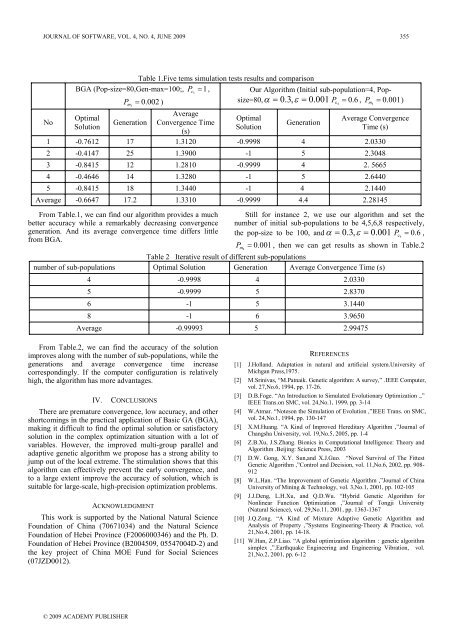View - Academy Publisher
View - Academy Publisher
View - Academy Publisher
You also want an ePaper? Increase the reach of your titles
YUMPU automatically turns print PDFs into web optimized ePapers that Google loves.
JOURNAL OF SOFTWARE, VOL. 4, NO. 4, JUNE 2009 355<br />
No<br />
Table 1.Five tems simulation tests results and comparison<br />
BGA (Pop-size=80,Gen-max=100;, P c 3<br />
= 1,<br />
Our Algorithm (Initial sub-population=4, Popsize=80,<br />
a = 0 .3, e = 0. 001 P c = 0. 6 , P 001<br />
P m 3<br />
= 0.002 )<br />
4<br />
m 4<br />
= 0. )<br />
Optimal<br />
Solution<br />
Generation<br />
Average<br />
Convergence Time<br />
(s)<br />
Optimal<br />
Solution<br />
Generation<br />
Average Convergence<br />
Time (s)<br />
1 -0.7612 17 1.3120 -0.9998 4 2.0330<br />
2 -0.4147 25 1.3900 -1 5 2.3048<br />
3 -0.8415 12 1.2810 -0.9999 4 2. 5665<br />
4 -0.4646 14 1.3280 -1 5 2.6440<br />
5 -0.8415 18 1.3440 -1 4 2.1440<br />
Average -0.6647 17.2 1.3310 -0.9999 4.4 2.28145<br />
From Table.1, we can find our algorithm provides a much<br />
better accuracy while a remarkably decreasing convergence<br />
Still for instance 2, we use our algorithm and set the<br />
number of initial sub-populations to be 4,5,6,8 respectively,<br />
generation. And its average convergence time differs little the pop-size to be 100, and a = 0 .3, e = 0. 001 P c = 0. 6 ,<br />
4<br />
from BGA.<br />
P m 4<br />
= 0.001 , then we can get results as shown in Table.2<br />
Table 2 Iterative result of different sub-populations<br />
number of sub-populations Optimal Solution Generation Average Convergence Time (s)<br />
4 -0.9998 4 2.0330<br />
5 -0.9999 5 2.8370<br />
6 -1 5 3.1440<br />
8 -1 6 3.9650<br />
Average -0.99993 5 2.99475<br />
From Table.2, we can find the accuracy of the solution<br />
improves along with the number of sub-populations, while the<br />
generations and average convergence time increase<br />
correspondingly. If the computer configuration is relatively<br />
high, the algorithm has more advantages.<br />
IV. CONCLUSIONS<br />
There are premature convergence, low accuracy, and other<br />
shortcomings in the practical application of Basic GA (BGA),<br />
making it difficult to find the optimal solution or satisfactory<br />
solution in the complex optimization situation with a lot of<br />
variables. However, the improved multi-group parallel and<br />
adaptive genetic algorithm we propose has a strong ability to<br />
jump out of the local extreme. The stimulation shows that this<br />
algorithm can effectively prevent the early convergence, and<br />
to a large extent improve the accuracy of solution, which is<br />
suitable for large-scale, high-precision optimization problems.<br />
ACKNOWLEDGMENT<br />
This work is supported by the National Natural Science<br />
Foundation of China (70671034) and the Natural Science<br />
Foundation of Hebei Province (F2006000346) and the Ph. D.<br />
Foundation of Hebei Province (B2004509, 05547004D-2) and<br />
the key project of China MOE Fund for Social Sciences<br />
(07JZD0012).<br />
REFERENCES<br />
[1] J.Holland. Adaptation in natural and artificial system.University of<br />
Michgan Press,1975.<br />
[2] M.Srinivas, “M.Patnaik. Genetic algorithm: A survey,” .IEEE Computer,<br />
vol. 27,No.61994pp. 17-26.<br />
[3] D.B.Foge. “An Introduction to Simulated Evolutionary Optimization .,”<br />
IEEE Trans.on SMC, vol. 24,No.11999pp. 3-14<br />
[4] W.Atmar. “Noteson the Simulation of Evolution ,”IEEE Trans. on SMC,<br />
vol. 24,No.11994pp. 130-147<br />
[5] X.M.Huang. “A Kind of Improved Hereditary Algorithm ,”Journal of<br />
Changsha University, vol. 19,No.52005pp. 1-4<br />
[6] Z.B.Xu, J.S.Zhang. Bionics in Computational Intelligence: Theory and<br />
Algorithm .Beijing: Science Press, 2003<br />
[7] D.W. Gong, X.Y. Sun,and X.J.Guo. “Novel Survival of The Fittest<br />
Genetic Algorithm ,”Control and Decision, vol. 11,No.62002pp. 908-<br />
912<br />
[8] W.L.Han. “The Improvement of Genetic Algorithm ,”Journal of China<br />
University of Mining & Technology, vol. 3,No.12001pp. 102-105<br />
[9] J.J.Deng, L.H.Xu, and Q.D.Wu. “Hybrid Genetic Algorithm for<br />
Nonlinear Function Optimization ,”Journal of Tongji University<br />
(Natural Science), vol. 29,No.112001pp. 1363-1367<br />
[10] J.Q.Zong. “A Kind of Mixture Adaptive Genetic Algorithm and<br />
Analysis of Property ,”Systems Engineering-Theory & Practice, vol.<br />
21,No.42001pp. 14-18.<br />
[11] W.Han, Z.P.Liao. “A global optimization algorithmgenetic algorithm<br />
simplex ,”.Earthquake Engineering and Engineering Vibration, vol.<br />
21,No.22001pp. 6-12<br />
© 2009 ACADEMY PUBLISHER
















